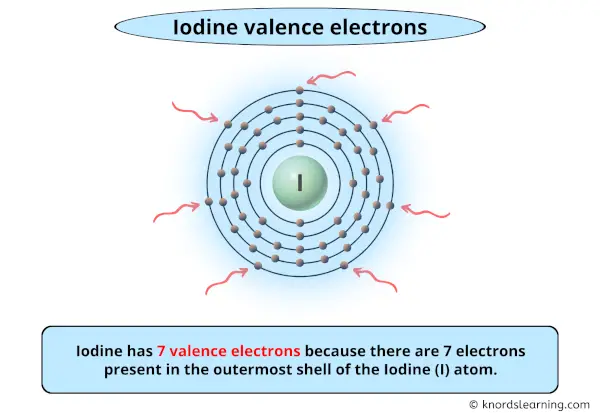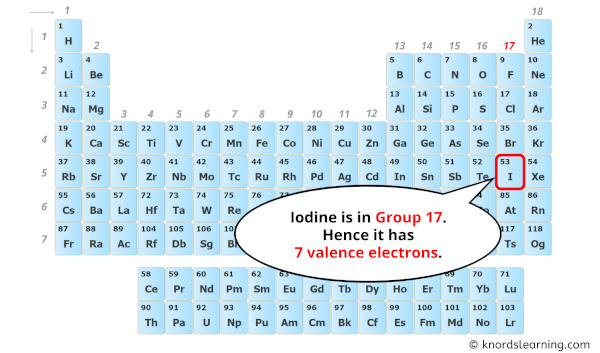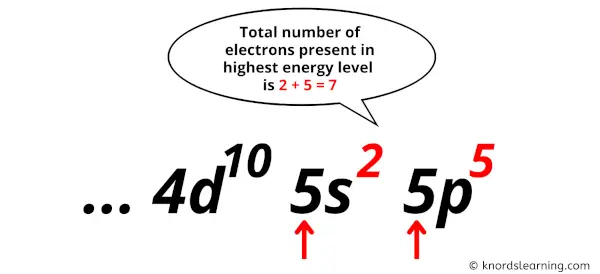
So you have seen the above image by now, right?
Awesome! You can see that iodine has 7 valence electrons.
But how can you say that Iodine has 7 valence electrons
+
How can you find these valence electrons?
Let’s discuss this in short.
Iodine has 7 valence electrons because there are 7 electrons present in the outermost shell of the Iodine (I) atom.
Now let’s see how you can easily find the valence electrons of an Iodine atom (I).
If you don’t want to read the texts, then you can also watch this video.
How to find the Valence Electrons? (2 Methods)
In order to find the valence electrons of an Iodine atom (I), you can use two methods.
Method 1: From the Periodic Table

To find out the valence electrons of Iodine, you have to see the position of iodine in the periodic table.
More specifically, you have to see the group wise position of Iodine element in the periodic table.
From the above image, you can see that the Iodine (I) is present in the group 17 of periodic table.
(Note: Group 17 is also called group 7A).
So, as the iodine element is present in group 17, it has 7 valence electrons.
In this way, by knowing the position of iodine element in periodic table, you can easily find its valence electrons.
Now let’s see another method for finding the number of valence electrons in iodine.
Method 2: From the Electron Configuration
If you want to find the valence electrons of iodine from its electron configuration, then you should know its electron configuration first.
Now there are many methods to write the electron configurations, but here I will show you the easiest method, i.e by using Aufbau principle.
Aufbau principle: The Aufbau principle simply states that the orbitals with the lower energy are filled first and then the orbitals with higher energy levels are filled.

According to the Aufbau principle, the orbitals are filled in the following order:
1s, 2s, 2p, 3s, 3p, 4s, 3d, 4p, 5s, 4d, 5p, 6s, 4f, 5d, 6p, 7s, 5f, 6d, 7p, and so on.
Also the maximum number of electrons that can be accommodated in s, p, d & f orbitals are mentioned in the below table.
| Orbitals | Maximum capacity of electrons [1] |
| s | 2 |
| p | 6 |
| d | 10 |
| f | 14 |
Now let’s try to find the electron configuration of Iodine by using the Aufbau principle.
Electron Configuration of Iodine:
Follow the steps mentioned below to get the electron configuration of Iodine.
- To write the electron configuration of iodine, we should first know the total number of electrons present in an iodine atom.
- The iodine atom has a total of 53 electrons because its atomic number is 53 and it is a neutral atom. [2]
- Now we have to fill these 53 electrons in the atomic orbitals according to the Aufbau principle.
- According to the Aufbau principle, the electrons will be filled first in 1s orbital, then in 2s orbital, then in 2p orbital, and so on…
- So from the Aufbau principle, we can get the electron configuration of the iodine atom as 1s2 2s2 2p6 3s2 3p6 3d10 4s2 4p6 4d10 5s2 5p5. [3]
Now in this electron configuration of iodine, we have to see the total number of electrons present in the highest energy level.

You can see in the electron configuration of iodine (1s2 2s2 2p6 3s2 3p6 3d10 4s2 4p6 4d10 5s2 5p5) that the highest energy level is 5. And the total number of electrons present in this energy level is 2 + 5 = 7.
So by knowing the electron configuration, we have found that the Iodine has 7 valence electrons.
I hope you have understood the methods of finding the valence electrons in iodine.
See more related topics for your practice;
Thallium Valence Electrons
Lead Valence Electrons
Bismuth Valence Electrons
Polonium Valence Electrons
Astatine Valence Electrons
Jay is an educator and has helped more than 100,000 students in their studies by providing simple and easy explanations on different science-related topics. With a desire to make learning accessible for everyone, he founded Knords Learning, an online learning platform that provides students with easily understandable explanations.
Read more about our Editorial process.

